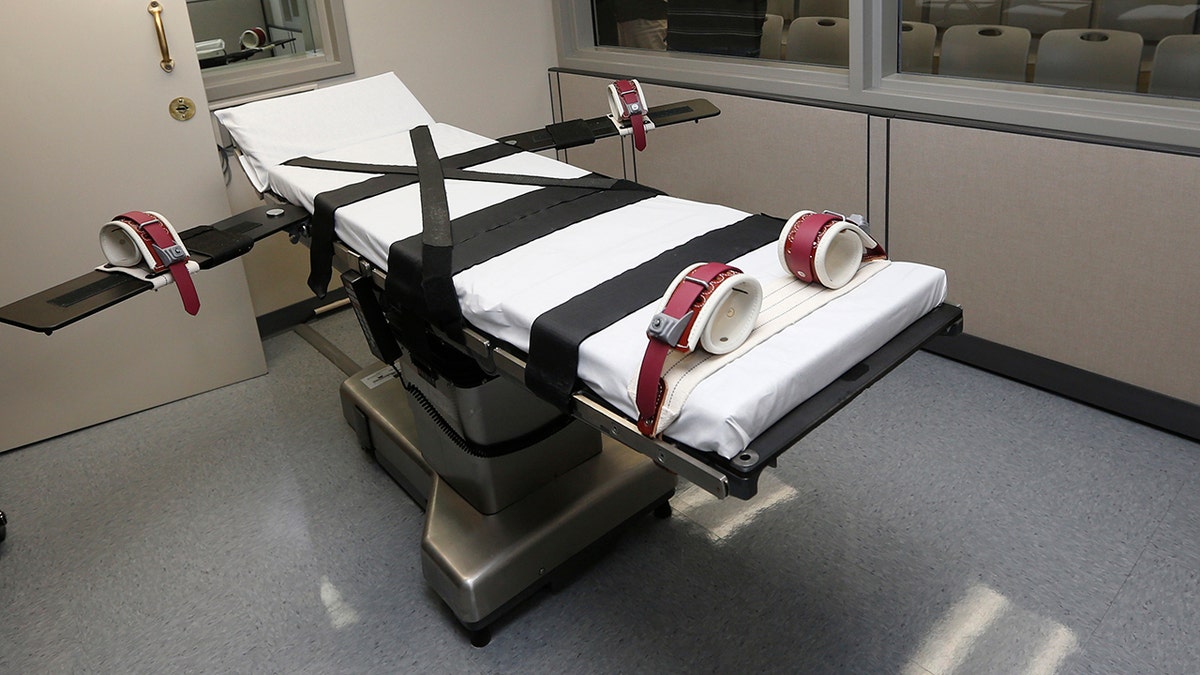Mississippi
Hidden History: Mississippi’s Nazi Prisoners of War
/cloudfront-us-east-1.images.arcpublishing.com/gray/KMFOFPN5GVANLDF7CCIXQRYBJY.jpg)
PEARL RIVER COUNTY, Miss. (WLOX) – View the second, digital-exclusive half of our two-part special below.
A discovered Nazi war medal, a Pearl River County prisoner of war camp, and a hidden history not many Mississippians know.
“When I found this thing, I didn’t have any idea what it was. I dug that thing out and I just- it was all corroded and covered in mud, so I just stuck it in my pocket. I got home and I put it under the sink and kind of scrubbed it a little bit and I was like… The first thing I saw was a swastika. And you don’t expect to see that, you know.”
Retired history teacher Jeremy Weir spends his free time searching for treasure, taking his metal detector out to forests and abandoned grounds across South Mississippi.
But one January day in the woods of Pearl River County, he found something he’d never expect- a Nazi war medal from World War II.
Weir researched the medal, as he loves to do with all his artifacts, and found it was issued during the early months of Germany and Italy’s invasion of North Africa.
“I’ve done a lot of research on it, of course,” Weir said. “And these were given to General Rommel’s forces in North Africa. Rommel was ‘the man’; he was the general for Hitler. But it was actually made by the Italians and given to the Germans.”
Featured on the medal is a swastika- the unmistakable symbol of Adolph Hitler’s Nazi Germany. On the other side, two gladiators fighting a crocodile, symbolizing Germany and Italy’s fight against England.
“They say that the significance of it was the gladiators were Germany and Italy and the crocodile was England, being the symbolic nature of it was… England being an island.. that’s where the crocodile came in,” Weir said.
But how did the medal, issued in North Africa so long ago, end up in South Mississippi?
Adding to the fascination of this find is where it was unearthed: just miles away from the World War II prisoner of war camp in Carriere, Mississippi: Hillcrest Farm.
This site was originally a dairy farm, until Nazi prisoners of war came to Mississippi in 1943. Silohs and remnants of buildings still stand, all these years later, a mark of what the property once was.
“I’ve taught Mississippi history many times, and just, we leave out the local history usually,” Weir said. “But having grown up locally, I knew about the history of the old POW camp here.”
But the little piece of Mississippi history isn’t common knowledge to most.
We spoke with a couple gentleman from Pearl River County, asking if it was surprising to learn, years ago, there were Germans in their own backyard.
“Yeah, very surprising,” said Peter Tims from Poplarville. “I had no idea they were anywhere around.”
Tims recalls his first and only run-in with the prisoners, who were wearing striped clothes and shopping in a local store, when he was just 15 years old.
“I encountered them in a store and I saw six or eight of them,” Tims said. “They were buying merchandise with whatever money they had. They were very congenial, talked, and there’s really about all I know about them.”
Jerry Mitchel, from Carriere, lived about a mile from Hillcrest Farm and would watch the prisoners ride on a school bus back and forth from Picayune to the camp.
“My father was friends with the bus driver. I begged him to let me ride the school bus. So, I got to ride it out to the prison camp where they were keeping them,” Mitchel said. “Of course, there were no problems. One guard on there is all. They were happy as they could be. Most of them wouldn’t want to go back to Germany or Italy. They liked it over here.”
But the Carriere camp wasn’t the only one in Mississippi. In fact, it was one of many across the state where German and Italian officers and soldiers remained under guard and worked for just pennies a day.
It all began 80 years ago, 7,000 miles away, in the desert sands of North Africa. In May 1943, 267,000 German and Italian soldiers were captured by Allied forces in the North African Campaign.
Three months later, 150,000 Axis prisoners of war were shipped to the United States. Camps began popping up all over the U.S., including in Mississippi, where four primary camps were established.
Among those camps is Camp Shelby, just south of Hattiesburg. Our curiosity peaked by the medal’s discovery, we decided to dig deeper into the history of Nazi prisoners in our state, taking a trip up to the Mississippi Armed Forces Museum at Camp Shelby to speak with a man who knows their history better than most.
“You would have several thousand POWs here at any given time,” said Tommy Lofton, Mississippi Armed Forces Museum Director, pointing toward the museum’s elaborate prisoners of war exhibit. “They would actually take Germans out in work parties and build sub-camps. In [Pearl River County], they had a bunch working in the timer industry.”
Lofton says many prisoners were offloaded at New York Harbor and brought directly to Camp Shelby.
“As we started moving into places like Normandy and France, you start seeing in the fall of ‘44, a number of prisoners here that are showing up that are new from the French campaigns in the west. We had prisoners here from all over the place.”
In September 1943, Nazi prisoners arrived by train to Camp Shelby where they were photographed, fingerprinted and assigned barracks.
But life as a prisoner of war in the U.S. was much different than the horrors that captured Allied soldiers experienced in Nazi and Japanese camps.
“They had it pretty good,” Lofton said. “The housing they had here, they could grow gardens in front of their barracks buildings. They had soccer teams, they had their own bands. You could have instruments provided by the camp. [They] built an amphitheater. They had their own canteen or PX where they could buy candy or sodas or beer, cigarrettes… other things.”
Lofton said prisoners would do physical labor in industries like timber and cotton, but they also built the lake at Paul B. Johnson State Park and completed other infrastructure projects around Camp Shelby.
“They were guarded all the time, but again were very instrumental to the success of the state’s economy during the 1940s,” Lofton said. “You know, it was an interesting experience to be able to have your enemy here literally in your own backyard, but also rely on them to help further your state and your economy.”
With many of the state’s rural workers enlisted in the war, farms struggled to find replacements. Nazi prisoners found themselves shipped out to the smaller sub-camps to keep Mississippi agriculture churning.
“It became a vital thing to keep timber, pulp wood and cotton industry- our state’s economy and agriculture economy- to have it thrive as much as possible,” Lofton said. “So we used German prisoners to do that.”
Lofton says not all prisoners in the state were “tried and true, hardcore party members or SS members.”
“In fact, a lot of the heavy political, SS soldiers were usually kind of ostracized by a lot of their fellow prisoners,” Lofton said. “A lot of the Germans and the ones we had here were just simple people. Grew up in farms, grew up in towns. Not everybody was born and raised to be hardcore soldiers. It’s kind of a unique mesh of personalities that you see come through here as prisoners.”
When Nazi Germany surrendered in May 1945, some 3,000 POWs were at Camp Shelby. By 1946, all were shipped back to Germany. But some of them came back to call Mississippi home.
“A lot of the Germans when they returned home, they found it either wasn’t the Germany they either believed in when they were fighting or the Germany they left behind, between getting bombed out or Russians and other folks coming in and tearing up territory,” Lofton said. “A lot of them realized it wasn’t so bad in places like Hattiesburg, Mississippi at Camp Shelby. So they came back to America to establish citizenship and become an American citizen.”
So what about the Nazi war medal found in Pearl River County? How did it get here? Is it possible the commendation was brought to Mississippi by a prisoner of war?
“Yes, more than likely,” Lofton said.
Lofton described how soldiers would keep regalia or pieces of home with them in a uniform or in a pocket. He says it wasn’t uncommon to find rings or other mementos at the camps, left by soldiers.
“It does make sense because it was people from the Afrika Korps that was here. And it was Germans and Italians,” Weir reflected on the thought of a POW bringing the medal to the camp.
Lofton says it’s very possible the medal was left behind by a prisoner of war who, like so many other captured soldiers, rebuked their Nazi affiliation to start a new life.
For curious explorers and local history experts like Weir and Lofton, how this World War II Nazi medal ended up in Mississippi only adds to the fascination.
“I’m a history buff so this is right up my alley. I love it,” Weir said. “We do a poor job at teaching history, especially local history… And our local history is rich, rich…”
If you yourself are a local history enthusiast and itching to learn more about the history of WWII prisoners of war in our state, stop by the Mississippi Armed Forces Museum at Camp Shelby or the Poplarville Historical Preservation Society, located in downtown Poplarville in Pearl River County.
Click here to subscribe to WLOX News on YouTube: Keep up with South Mississippi news, sports, and local events on our YouTube channel!
Copyright 2023 WLOX. All rights reserved.

Mississippi
Mississippi asks for execution date of man convicted in 1993 killing, lawyers plan to appeal case to SCOTUS

Mississippi Attorney General Lynn Fitch, a Republican, is seeking an execution date for a convicted killer who has been on death row for 30 years, but his lawyer argues that the request is premature since the man plans to appeal to the U.S. Supreme Court.
Charles Ray Crawford, 58, was sentenced to death in connection with the 1993 kidnapping and killing of 20-year-old community college student Kristy Ray, according to The Associated Press.
During his 1994 trial, jurors pointed to a past rape conviction as an aggravating circumstance when they issued Crawford’s sentence, but his attorneys said Monday that they are appealing that conviction to the Supreme Court after a lower court ruled against them last week.
Crawford was arrested the day after Ray was kidnapped from her parents’ home and stabbed to death in Tippah County. Crawford told officers he had blacked out and did not remember killing her.
TEXAS LAWMAKER PROPOSES BILL TO ABOLISH DEATH PENALTY IN LONE STAR STATE: ‘I THINK SENTIMENT IS CHANGING’
Mississippi death row inmate Charles Ray Crawford, who was convicted and sentenced to death in 1994 in the 1993 kidnapping and killing of a community college student, 20-year-old Kristy Ray. (Mississippi Department of Corrections via AP)
He was arrested just days before his scheduled trial on a charge of assaulting another woman by hitting her over the head with a hammer.
The trial for the assault charge was delayed several months before he was convicted. In a separate trial, Crawford was found guilty in the rape of a 17-year-old girl who was friends with the victim of the hammer attack. The victims were at the same place during the attacks.
Crawford said he also blacked out during those incidents and did not remember committing the hammer assault or the rape.
During the sentencing portion of Crawford’s capital murder trial in Ray’s death, jurors found the rape conviction to be an “aggravating circumstance” and gave him the death sentence, according to court records.
PRO-TRUMP PRISON WARDEN ASKS BIDEN TO COMMUTE ALL DEATH SENTENCES BEFORE LEAVING

During the sentencing portion of Crawford’s capital murder trial, jurors found his prior rape conviction to be an “aggravating circumstance” and gave him the death sentence. (iStock)
In his latest federal appeal of the rape case, Crawford claimed his previous lawyers provided unconstitutionally ineffective assistance for an insanity defense. He received a mental evaluation at the state hospital, but the trial judge repeatedly refused to allow a psychiatrist or other mental health professional outside the state’s expert to help in Crawford’s defense, court records show.
On Friday, a majority of the 5th U.S. Circuit Court of Appeals rejected Crawford’s appeal.
But the dissenting judges wrote that he received an “inadequately prepared and presented insanity defense” and that “it took years for a qualified physician to conduct a full evaluation of Crawford.” The dissenting judges quoted Dr. Siddhartha Nadkarni, a neurologist who examined Crawford.
“Charles was laboring under such a defect of reason from his seizure disorder that he did not understand the nature and quality of his acts at the time of the crime,” Nadkarni wrote. “He is a severely brain-injured man (corroborated both by history and his neurological examination) who was essentially not present in any useful sense due to epileptic fits at the time of the crime.”

Photo shows the gurney of an execution chamber. (AP Photo/Sue Ogrocki, File)
CLICK HERE TO GET THE FOX NEWS APP
Crawford’s case has already been appealed multiple times using various arguments, which is common in death penalty cases.
Hours after the federal appeals court denied Crawford’s latest appeal, Fitch filed documents urging the state Supreme Court to set a date for Crawford’s execution by lethal injection, claiming that “he has exhausted all state and federal remedies.”
However, the attorneys representing Crawford in the Mississippi Office of Post-Conviction Counsel filed documents on Monday stating that they plan to ask the U.S. Supreme Court to overturn the appeals court’s ruling.
The Associated Press contributed to this report.
Mississippi
Mississippi Highway Patrol urging travel safety ahead of Thanksgiving

The rest of the night will be calm. We’ll cool down into the mid to upper 50s overnight tonight. A big cold front will arrive on Thanksgiving, bringing a few showers. Temperatures will drop dramatically after the front passes. It will be much cooler by Friday! Frost will be possible this weekend. Here’s the latest forecast.
Mississippi
Ole Miss football vs Mississippi State score prediction, scouting report in 2024 Egg Bowl

OXFORD — There’s always an added element of intensity in the Egg Bowl.
It will be important for Ole Miss football (8-3, 4-3) to find an extra gear against Mississippi State (2-9, 0-7 SEC) in Friday’s rivalry matchup (2:30 p.m., ABC). The Rebels are coming off a deflating loss at Florida that left Ole Miss’ College Football Playoff hopes hanging by a thread.
Mississippi State is slogging through a difficult year under first-year head coach Jeff Lebby. While first-year head coaches have fared surprisingly well in Egg Bowl games over the years, the Rebels will be heavy favorites at Vaught-Hemingway Stadium on Black Friday. The game is just the second Egg Bowl in eight years not to be played on Thanksgiving.
Let’s dive into the matchup:
Why Jaxson Dart, Rebels’ offense should be able to extend drives
Usually defenses that force opposing into offenses into third-down situations fare well. For Mississippi State, completing the job on third down has been difficult.
The Bulldogs have allowed SEC opponents to convert on 70 of 147 third downs. That is 47.6%, and the worst mark in the SEC. Ole Miss’ defense, by comparison, is No. 5 in the SEC at 32%.
More broadly, the Bulldogs’ defense has been getting gashed in SEC play. Mississippi State has allowed 40.7 points per SEC game. Even if star Ole Miss receiver Tre Harris is out because of an injury, the Rebels have a good opportunity to light up the scoreboard like they did in a 63-31 win at Arkansas.
Can Ole Miss rack up the sacks, keep Dart upright?
Stats indicate Friday’s game will be easier for Ole Miss quarterback Jaxson Dart than Mississippi State quarterback Michael Van Buren Jr.
Mississippi State has allowed 35 sacks against SEC opponents. The inverse also bodes poorly for the Bulldogs. Mississippi State is last in the SEC in sacks. In 11 SEC games, the Bulldogs have just eight.
To make it harder on Van Buren Jr., Ole Miss’ defense leads the SEC in sacks. Look for him to get pressured early and often by a ferocious defensive line. There could − and maybe should − be two or three Rebels with multiple sacks in the Egg Bowl.
Rebels rushers Princely Umanmielen and Suntarine Perkins are prime candidates to feast. They each have 10.5 sacks, which ties them for No. 6 in the nation.
Will Ole Miss try to run up the score on the Bulldogs?
Aside from satisfying its fan base in a heated rivalry, Ole Miss has another reason to try to win big against Mississippi State. It’s the Rebels’ last chance to impress the College Football Playoff Committee.
Because of chaos in Week 13, the Rebels can still cling to an outside shot at making the College Football Playoff. While the Rebels will need other teams to lose Saturday, a dominating win Friday will only help their case.
On the flip side, even a narrow win against a Mississippi State team that hasn’t won a Power Four game this season would make it easier for the committee to exclude the Rebels.
Ole Miss football vs Mississippi State Egg Bowl score prediction
Ole Miss 42, Mississippi State 9: Each of the Rebels’ SEC games has resulted in one of two things: a close loss or blowout win. Expect the latter in the final regular season game at Vaught-Hemingway Stadium. Ole Miss has the pass rush to create turnovers that will overwhelm an outmatched Bulldogs team.
Sam Hutchens covers Ole Miss for the Clarion Ledger. Email him at Shutchens@gannett.com or reach him on X at @Sam_Hutchens_
-

 Science1 week ago
Science1 week agoTrump nominates Dr. Oz to head Medicare and Medicaid and help take on 'illness industrial complex'
-

 Politics1 week ago
Politics1 week agoTrump taps FCC member Brendan Carr to lead agency: 'Warrior for Free Speech'
-
/cdn.vox-cdn.com/uploads/chorus_asset/file/25739950/247386_Elon_Musk_Open_AI_CVirginia.jpg)
/cdn.vox-cdn.com/uploads/chorus_asset/file/25739950/247386_Elon_Musk_Open_AI_CVirginia.jpg) Technology1 week ago
Technology1 week agoInside Elon Musk’s messy breakup with OpenAI
-

 Lifestyle1 week ago
Lifestyle1 week agoSome in the U.S. farm industry are alarmed by Trump's embrace of RFK Jr. and tariffs
-

 World1 week ago
World1 week agoProtesters in Slovakia rally against Robert Fico’s populist government
-

 Health4 days ago
Health4 days agoHoliday gatherings can lead to stress eating: Try these 5 tips to control it
-

 News1 week ago
News1 week agoThey disagree about a lot, but these singers figure out how to stay in harmony
-

 Health2 days ago
Health2 days agoCheekyMD Offers Needle-Free GLP-1s | Woman's World















